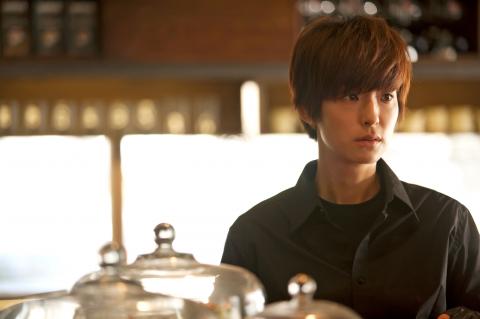Three years after his record-breaking debut feature You Are the Apple of My Eye (那些年,我們一起追的女孩), best-selling writer and director Jiubadao (九把刀 or “Nine Knives,” real name Giddens Ko, 柯景騰) returns with Cafe. Waiting. Love (等一個人咖啡), a romantic comedy based on his novel of the same title. This time, however, Jiubadao’s working partner Chiang Chin-lin (江金霖) is in the director’s seat and supported by big-shot producer Angie Chai (柴智屏). The movie rounds out nicely with an appealing cast of novices and veterans, including Hong Kong’s former pop diva Vivian Chow (周慧敏) as a guest performer.
Billed as the second installment of Jiubadao’s love trilogy, the highly anticipated film brings an entertaining mixture of zany slapstick and manga-esque humor, but lacks the youthful spark and ingenuity that made its predecessor shine.
The film begins with Siying (Vivian Sung, 宋芸樺), a loud, outspoken college girl who is almost hit by a bus. Believing Zeyu (Marcus Chang, 張立昂) is the man who saved her from death, Siying follows the mysterious and gentle young man to Cafe. Waiting. Love, a coffee shop managed by tomboy barista Abusi (Megan Lai, 賴雅妍). She applies for a job and is hired by the beautiful, melancholy owner (Vivian Chow, 周慧敏).

Photo courtesy of Amazing Film Studio
Siying spends most of her time harboring a secret crush on Zeyu until she meets the goofy and upbeat A-Tuo (Bruce, 布魯斯), who attends the same college as her. Standing up to defend A-Tuo when he is teased by his buddies for losing his girlfriend to Abusi, Siying impresses A-Tuo, and the two soon become good friends.
A-Tuo, who works various part-time jobs to save money to travel, introduces Siying to a motley group of characters such as film director-turned-gangster mediator Brother Bao (Lee Luo, 李王羅) and sexy Auntie Jindao (Paulien Lan, 藍心湄). Together, the two have great fun, but Siying takes no notice of A-Tuo’s growing affection for her.
It isn’t until Siying confesses her love to Zeyu and discovers his secret that she realizes her heart belongs to A-Tuo, who is on his way to Africa.

Photo courtesy of Amazing Film Studio
Co-produced and written by Jiubadao, the film is packed with juvenile fun and surprise plot twists which, not to give the story away, involve supernatural powers and a couple of ghosts. As in You Are the Apple of My Eye, which discovered new talent Ko Chen-tung (柯震東) and propelled Michelle Chen (陳妍希) into the limelight, Jiubadao and his crew know how to pick their cast.
Newbie actors Vivian Sung and Bruce both appear natural and relaxed in their roles, sharing electrifying chemistry on the screen. Having gradually withdrawn from the public eye in recent years, Vivian Chow simply delights with her rare, elegant presence. Worth a special mention is Lai’s relatively quiet performance as the tomboy lesbian.
At two hours, the film could have used some pruning. While fueling the story with much needed dramatic tension and slapstick humor, the subplots involving Brother Bao and Auntie Jindao as well as Vivian Chow’s character appear not fully integrated into the story, rending the film less focused and structured. Jokes and characters are sometimes more stereotypical than organic, short of sparks to bring them to live.

Photo courtesy of Amazing Film Studio
Slated to open simultaneously in Taiwan and Hong Kong today, Cafe. Waiting. Love is expected to become a summer blockbuster, following the tremendous success of You Are the Apple of My Eye, which passed the previous record of HK$61 million (US$7.93 million) in 2011 to become the highest-grossing Chinese-language movie in Hong Kong’s history.

Taiwan has next to no political engagement in Myanmar, either with the ruling military junta nor the dozens of armed groups who’ve in the last five years taken over around two-thirds of the nation’s territory in a sprawling, patchwork civil war. But early last month, the leader of one relatively minor Burmese revolutionary faction, General Nerdah Bomya, who is also an alleged war criminal, made a low key visit to Taipei, where he met with a member of President William Lai’s (賴清德) staff, a retired Taiwanese military official and several academics. “I feel like Taiwan is a good example of

March 2 to March 8 Gunfire rang out along the shore of the frontline island of Lieyu (烈嶼) on a foggy afternoon on March 7, 1987. By the time it was over, about 20 unarmed Vietnamese refugees — men, women, elderly and children — were dead. They were hastily buried, followed by decades of silence. Months later, opposition politicians and journalists tried to uncover what had happened, but conflicting accounts only deepened the confusion. One version suggested that government troops had mistakenly killed their own operatives attempting to return home from Vietnam. The military maintained that the

Before the last section of the round-the-island railway was electrified, one old blue train still chugged back and forth between Pingtung County’s Fangliao (枋寮) and Taitung (台東) stations once a day. It was so slow, was so hot (it had no air conditioning) and covered such a short distance, that the low fare still failed to attract many riders. This relic of the past was finally retired when the South Link Line was fully electrified on Dec. 23, 2020. A wave of nostalgia surrounded the termination of the Ordinary Train service, as these train carriages had been in use for decades

Lori Sepich smoked for years and sometimes skipped taking her blood pressure medicine. But she never thought she’d have a heart attack. The possibility “just wasn’t registering with me,” said the 64-year-old from Memphis, Tennessee, who suffered two of them 13 years apart. She’s far from alone. More than 60 million women in the US live with cardiovascular disease, which includes heart disease as well as stroke, heart failure and atrial fibrillation. And despite the myth that heart attacks mostly strike men, women are vulnerable too. Overall in the US, 1 in 5 women dies of cardiovascular disease each year, 37,000 of them